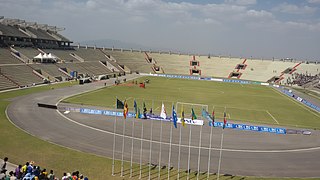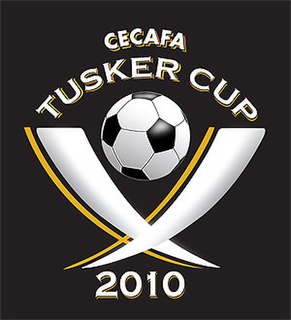Group A
| Pos | Team | Pld | W | D | L | GF | GA | GD | Pts | Qualification |
|---|---|---|---|---|---|---|---|---|---|---|
| 1 | 3 | 2 | 1 | 0 | 7 | 2 | +5 | 7 | Advance to knockout stage | |
| 2 | 3 | 2 | 0 | 1 | 5 | 2 | +3 | 6 | ||
| 3 | 3 | 1 | 1 | 1 | 3 | 2 | +1 | 4 | ||
| 4 | 3 | 0 | 0 | 3 | 0 | 9 | −9 | 0 |
(A) Advance to a further round; (E) Eliminated; (H) Host
The 2015 CECAFA Cup Group Stage was the opening round of the CECAFA Cup, a competition played between national teams from the Council for East and Central Africa Football Associations.
The Group Stage took place from November 21-28, 2015, and consisted of twelve teams divided into three groups of four, with each team playing every other in the group in a round–robin format. The best two teams from each group automatically advanced to the quarterfinals, and the two best third-placed teams advanced as well.
The biggest wins of the group stages were all 4–0 wins: Tanzania beat Somalia, Uganda beat Zanzibar, and Sudan beat Djibouti. The only other game that contained four goals was a 3–1 win for Zanzibar over Kenya.
No team won all of its games; Tanzania and South Sudan were the most successful teams as they both earned seven of nine possible points (two wins and a draw).
| Pos | Team | Pld | W | D | L | GF | GA | GD | Pts | Qualification |
|---|---|---|---|---|---|---|---|---|---|---|
| 1 | 3 | 2 | 1 | 0 | 7 | 2 | +5 | 7 | Advance to knockout stage | |
| 2 | 3 | 2 | 0 | 1 | 5 | 2 | +3 | 6 | ||
| 3 | 3 | 1 | 1 | 1 | 3 | 2 | +1 | 4 | ||
| 4 | 3 | 0 | 0 | 3 | 0 | 9 | −9 | 0 |
| Pos | Team | Pld | W | D | L | GF | GA | GD | Pts | Qualification |
|---|---|---|---|---|---|---|---|---|---|---|
| 1 | 3 | 2 | 0 | 1 | 5 | 2 | +3 | 6 | Advance to knockout stage | |
| 2 | 3 | 1 | 1 | 1 | 4 | 4 | 0 | 4 | ||
| 3 | 3 | 1 | 1 | 1 | 2 | 2 | 0 | 4 | ||
| 4 | 3 | 1 | 0 | 2 | 3 | 6 | −3 | 3 |
| Pos | Team | Pld | W | D | L | GF | GA | GD | Pts | Qualification |
|---|---|---|---|---|---|---|---|---|---|---|
| 1 | 3 | 2 | 1 | 0 | 4 | 0 | +4 | 7 | Advance to knockout stage | |
| 2 | 3 | 2 | 0 | 1 | 5 | 3 | +2 | 6 | ||
| 3 | 3 | 1 | 1 | 1 | 5 | 2 | +3 | 4 | ||
| 4 | 3 | 0 | 0 | 3 | 0 | 9 | −9 | 0 |
| Djibouti | 0–4 | |
|---|---|---|
| Report |

The Ethiopia national football team, nicknamed ዋሊያ, after the Walia , represents Ethiopia in men's international football and is controlled by the Ethiopian Football Federation, the governing body for football in Ethiopia. The team has been representing Ethiopia in regional, continental, and international competitions since its founding in 1943. The Walias play their home games at Addis Ababa Stadium located in the capital city of Addis Ababa. They are currently ranked 150th in the world according to the FIFA World Rankings and 44th in CAF.

Hawassa is a city in Ethiopia, on the shores of Lake Awassa in the Great Rift Valley. It is 273 km (170 mi) south of Addis Ababa via Bishoftu, 130 km (81 mi) east of Sodo, and 75 km (47 mi) north of Dilla. The town serves as the capital of the Sidama Region. It lies on the Trans-African Highway 4 Cairo-Cape Town and has a latitude and longitude of 7°3′N38°28′E and an elevation of 1,708 meters (5,604 ft) above sea level. Its name comes from a Sidamic word meaning "wide body of water".

Hawassa International Stadium is a multi-use stadium in Awassa, Ethiopia. It is used mostly for football matches and serves as the home stadium of Awassa City F.C. The stadium has a capacity of 60,000 people.but still on process

The Ethiopian Premier League, also known as the BetKing Ethiopian Premier League for sponsorship reasons, is the top association football division in Ethiopia. The league is regulated by the Ethiopian Premier League Share Company. Established in 1997, it replaced the former first division (est.1944). Contested by sixteen clubs, it operates on a system of promotion and relegation with the other secondary and tertiary leagues in Ethiopia. The league has been an annual competition since the 1997–98 season with Saint George S.C. emerging as the country's leading club in this era with 14 titles.
Hawassa University (HU) is a residential national university in Hawassa, Sidama Region, Ethiopia. It is approximately 278 kilometres (173 mi) south of Addis Ababa, Ethiopia. The Ministry Science and Higher Education (Ethiopia) admits qualified students to Hawassa University based on their score on the Ethiopian Higher Education Entrance Examination (EHEEE).
The CECAFA Club Cup is a football club tournament organised by CECAFA. It has been known as the Kagame Interclub Cup since 2002, when Rwandan President Paul Kagame began sponsoring the competition. It is contested by clubs from East and Central Africa.

The Tanzania national women's football team, is the national team of Tanzania and is controlled by the Tanzania Football Federation. They are nicknamed the Twiga Stars.

The 2010 CECAFA Senior Challenge Cup is the 34th edition of the competition. The host of the tournament is Tanzania.

The 2011 CECAFA Cup was an international football competition consisting of East and Central African national teams. It was the 35th edition of the annual CECAFA Cup. The tournament was hosted by Tanzania for the second consecutive year and seventh time overall.
The 2012 Kagame Interclub Cup was the 37th edition of the Kagame Interclub Cup, which is organised by CECAFA. It began on 14 July and ended on 28 July 2012. Tanzania hosted the tournament for their eleventh time since it officially began in 1974, when they were also hosts. The tournament made Wau Salaam the first South Sudanese club to take part in an international club tournament.
The 2006 Cecafa Senior Challenge Cup, sometimes called the Al Amoudi Senior Challenge Cup due to being sponsored by Ethiopian millionaire Mohammed Hussein Al Amoudi, was the 30th edition of the international football tournament, which involved teams from Southern and Central Africa. The matches were all played in Addis Ababa from 25 November to 10 December. It was competed between the same teams as the previous tournament, except for Eritrea, who did not enter due to their long-running clash with Ethiopia regarding borders, and Kenya, the five-time champions, were serving a ban which was issued on 18 October 2006, which was then an indefinite from international football by the decree of the Fédération Internationale de Football Association, or FIFA; this after Kenya "regularly violated or ignored" "Fifa's statutes, regulations and decisions". Malawi and Zambia joined the tournament after being invited, and competed as guest teams as they were from the federation Council of Southern Africa Football Associations (COSAFA), whereas the rest of the teams were from the Council for East and Central Africa Football Associations (CECAFA). The reasoning behind their invitation was that it would "boost the competitiveness of this year's tournament". The defending champions, Ethiopia, were knocked out in the quarter-finals after coming second in their group, and Sudan claimed their second title despite being beaten by Zambia, as Zambia were guests.
Group J of the 2017 Africa Cup of Nations qualification tournament was one of the thirteen groups to decide the teams which qualified for the 2017 Africa Cup of Nations finals tournament. The group consisted of four teams: Algeria, Ethiopia, Lesotho, and Seychelles.
The 2015 African U-20 Women's World Cup Qualifying Tournament was the 8th edition of the African U-20 Women's World Cup Qualifying Tournament, the biennial international youth football competition organised by the Confederation of African Football (CAF) to determine which women's under-20 national teams from Africa qualify for the FIFA U-20 Women's World Cup. Players born on or after 1 January 1996 were eligible to compete in the tournament.
Bahir Dar International Stadium is an unfinished multi-purpose stadium in Bahir Dar, Amhara Region, Ethiopia. It is used mostly for football matches although it also has athletics facilities. The stadium has a capacity of 60,000 people. Currently, the stadium is the largest in the country by capacity, but currently lacks seats, an awning, or any facilities, such as concessions or bathrooms, beyond structural concrete elements.
Group F of the 2019 Africa Cup of Nations qualification tournament was one of the twelve groups to decide the teams which qualified for the 2019 Africa Cup of Nations finals tournament. The group consisted of four teams: Ghana, Ethiopia, Sierra Leone, and Kenya, before Sierra Leone's disqualification.
Ali Sulieman is an Eritrean footballer who plays for Ethiopian Premier League club Bahir Dar Kenema and the Eritrea national team.
The 2019 CECAFA Women's Championship was the fourth edition of the association football tournament for women's national teams in the East African region.
The 2021 CECAFA U-23 Challenge Cup was 41st edition of the annual CECAFA Cup, an international football competition consisting of the national U-23 teams of member nations of the Council for East and Central Africa Football Associations (CECAFA).
The 2021 CECAFA Kagame Interclub Cup was 43rd edition of the Kagame Interclub Cup, a football competition for clubs in East and Central Africa, which is organised by CECAFA. It took place in Tanzania from 1 to 14 August 2021.